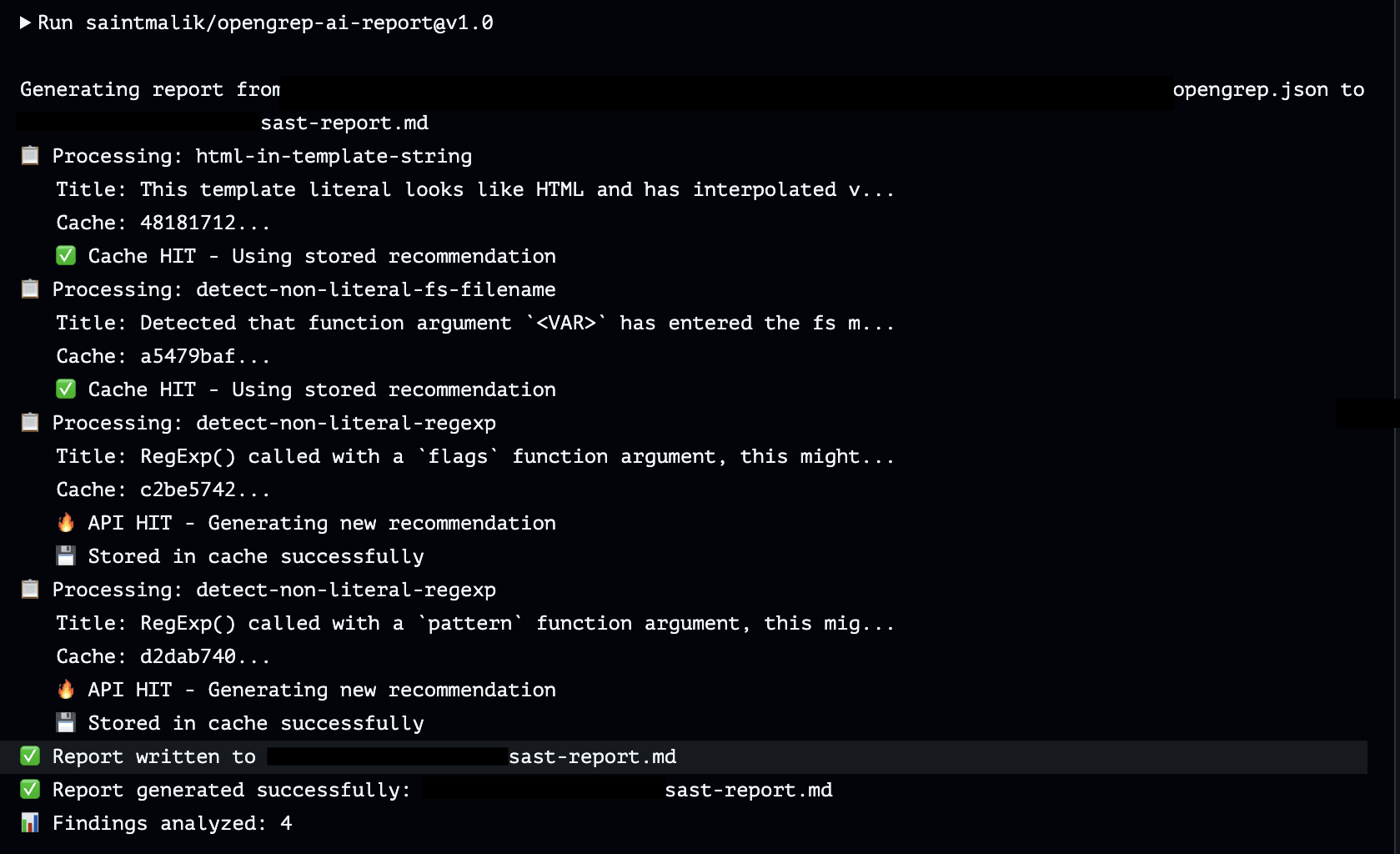Optimizing Semantic Remediation, Using LLMs and Deterministic Caching to Scale SAST Analysis
Scaling DevSecOps: From One Engineer to Enabling Every Product Team
Scaling DevSecOps without burnout: how I moved from manual security reviews to AI-assisted recommendations that empower product teams.

In the past, I was working on just a handful of products. When a static application security testing (SAST) scan returned findings, I could review each one, write remediation advice, and even work directly with developers.
But as I started supporting multiple product teams each shipping fast, each with its own codebase that manual approach quickly became unsustainable.
SAST findings ballooned from dozens to hundreds, then thousands. Developers wanted actionable advice, fast. I needed a way to scale security recommendations without burning out or sacrificing quality.
Why Not Just Use LLMs for Everything?
I turned to Large Language Models (LLMs) pecifically DeepSeek to generate remediation advice. The results were impressive:
- Recommendations were specific
- Contextual
- Often included actionable links
But there was a catch: LLM APIs are rate-limited and can be expensive at scale. If I made an API call for every finding in every scan across all teams, I’d hit the limit fast (and rack up a big bill).
Caching with Cloudflare D1: Never Repeat Yourself
So I built a caching layer using Cloudflare D1, a serverless SQLite database. Here’s my approach:
- Normalize every SAST finding (by rule, title, description)
- Hash it to create a deterministic cache key
- Check D1 first: If an identical finding has been seen before, retrieve the cached recommendation
- Otherwise: Ask DeepSeek for a new recommendation, then cache it to D1 for future scans
This meant:
- No duplicate API calls, no wasted quota
- Teams working on similar stacks get consistent advice
- My security pipeline is fast, reliable, and cost-effective
The Technical Flow
llmhelper.js (AI Recommendation + Caching)
const fetch = require("node-fetch");
const crypto = require("crypto");
const OpenAI = require("openai");
let openai = null;
function getOpenAIClient() {
if (!openai) {
const MODEL_PROVIDER = (process.env.MODEL_PROVIDER || "openai").toLowerCase();
if (MODEL_PROVIDER === "deepseek") {
const DEEPSEEK_API_KEY = process.env.DEEPSEEK_API_KEY;
if (!DEEPSEEK_API_KEY) {
throw new Error("DEEPSEEK_API_KEY environment variable is missing or empty");
}
openai = new OpenAI({
baseURL: "https://api.deepseek.com",
apiKey: DEEPSEEK_API_KEY,
});
openai._modelName = "deepseek-chat";
} else if (MODEL_PROVIDER === "openai") {
const OPENAI_API_KEY = process.env.OPENAI_API_KEY;
if (!OPENAI_API_KEY) {
throw new Error("OPENAI_API_KEY environment variable is missing or empty");
}
openai = new OpenAI({
apiKey: OPENAI_API_KEY,
});
openai._modelName = "gpt-4.1"
} else {
throw new Error("Unsupported MODEL_PROVIDER. Use 'deepseek' or 'openai'.");
}
}
return openai;
}
function getD1Endpoint() {
const CLOUDFLARE_ACCOUNT_ID = process.env.CLOUDFLARE_ACCOUNT_ID;
const D1_DATABASE_ID = process.env.D1_DATABASE_ID;
if (!CLOUDFLARE_ACCOUNT_ID || !D1_DATABASE_ID) {
throw new Error("CLOUDFLARE_ACCOUNT_ID or D1_DATABASE_ID environment variables are missing");
}
return `https://api.cloudflare.com/client/v4/accounts/${CLOUDFLARE_ACCOUNT_ID}/d1/database/${D1_DATABASE_ID}/query`;
}
function normalize(str) {
return (str || "").trim().replace(/\s+/g, " ");
}
function makeCacheKey(finding) {
const rule = normalize(finding.rule);
const title = normalize(
finding.title?.replace(/function argument `[^`]+`/, "function argument `<VAR>`")
);
const description = normalize(finding.description);
const keyInput = `${rule}|${title}|${description}`;
const hash = crypto.createHash("sha256").update(keyInput).digest("hex");
return hash;
}
async function d1Query(sql, params = []) {
const D1_API_KEY = process.env.D1_API_KEY;
if (!D1_API_KEY) {
throw new Error("D1_API_KEY environment variable is missing or empty");
}
const D1_ENDPOINT = getD1Endpoint();
const res = await fetch(D1_ENDPOINT, {
method: "POST",
headers: {
Authorization: `Bearer ${D1_API_KEY}`,
"Content-Type": "application/json",
},
body: JSON.stringify({ sql, params }),
});
const data = await res.json();
if (!res.ok) {
throw new Error(`D1 error: ${data.errors?.[0]?.message || res.statusText}`);
}
return data.result?.[0]?.results || [];
}
async function ensureTable() {
await d1Query(`
CREATE TABLE IF NOT EXISTS recommendations (
id INTEGER PRIMARY KEY AUTOINCREMENT,
cache_key TEXT UNIQUE,
recommendation TEXT
);
`);
}
async function getAIRecommendation(finding, temperature = 0.0, maxRetries = 5) {
await ensureTable();
const cacheKey = makeCacheKey(finding);
const ruleDisplay = `${finding.rule}`;
const titlePreview = finding.title?.substring(0, 60) + (finding.title?.length > 60 ? "..." : "");
console.log(`\nProcessing: ${ruleDisplay}`);
console.log(`Title: ${titlePreview}`);
console.log(`Cache: ${cacheKey.substring(0, 8)}...`);
const rows = await d1Query(
`SELECT recommendation FROM recommendations WHERE cache_key = ? LIMIT 1`,
[cacheKey]
);
if (rows.length > 0 && rows[0].recommendation) {
console.log(`Cache HIT - Using stored recommendation`);
return rows[0].recommendation;
}
console.log(`API HIT - Generating new recommendation`);
const prompt = `
You are a senior DevSecOps assistant.
For the following security issue, provide a short, actionable remediation recommendation and a reference link if possible.
Rule: ${finding.rule}
Title: ${finding.title}
Description: ${finding.description}
Recommendation:
`;
let lastError;
let recommendation;
for (let attempt = 0; attempt < maxRetries; attempt++) {
try {
const openaiClient = getOpenAIClient();
const modelName = openaiClient._modelName;
const response = await openaiClient.chat.completions.create({
model: modelName,
messages: [{ role: "user", content: prompt }],
temperature,
});
recommendation = response.choices[0].message.content.trim();
await d1Query(
`INSERT INTO recommendations (cache_key, recommendation) VALUES (?, ?) ON CONFLICT(cache_key) DO NOTHING`,
[cacheKey, recommendation]
);
console.log(`Stored in cache successfully`);
return recommendation;
} catch (err) {
lastError = err;
console.log(`API attempt ${attempt + 1} failed: ${err.message}`);
if (err.status === 429) {
const delay = Math.pow(2, attempt) * 1000 + Math.random() * 500;
console.log(` ⏳ Retrying in ${Math.floor(delay)}ms...`);
await new Promise((res) => setTimeout(res, delay));
} else {
break;
}
}
}
console.log(`Failed to get recommendation after ${maxRetries} attempts`);
throw lastError;
}
module.exports = { getAIRecommendation };
reports.js (Findings Processing & Report Generation)
This script deduplicates findings, enriches them with recommendations, and outputs a summary markdown.
const fs = require("fs");
const path = require("path");
const { getAIRecommendation } = require("./llmhelper");
class SecurityReportParser {
constructor() {}
normalizeSeverity(raw) {
const level = (raw || "").toUpperCase();
if (level === "ERROR") return "high";
if (level === "WARNING") return "medium";
if (level === "INFO") return "low";
return "medium";
}
normalizeTitle(title) {
return title.replace(/function argument `[^`]+`/, 'function argument `<VAR>`');
}
mergeFindings(findings) {
const map = new Map();
for (const f of findings) {
const normalizedTitle = this.normalizeTitle(f.title);
const key = `${f.rule}|${normalizedTitle}|${f.severity}`;
const codeSnippets = [f.codeSnippets].flat().filter(Boolean);
const lineNumbers = Array(codeSnippets.length).fill(f.lineNumbers ?? "?");
const codeFiles = Array(codeSnippets.length).fill(f.file ?? "?");
if (!map.has(key)) {
map.set(key, {
...f,
title: normalizedTitle,
lineNumbers,
codeSnippets,
codeFiles,
});
} else {
const existing = map.get(key);
existing.lineNumbers.push(...lineNumbers);
existing.codeSnippets.push(...codeSnippets);
existing.codeFiles.push(...codeFiles);
}
}
return Array.from(map.values());
}
async enrichFindings(findings) {
for (const finding of findings) {
if (finding.severity === "high" || finding.severity === "medium") {
try {
finding.recommendation = await getAIRecommendation(finding);
} catch (err) {
console.warn(`Failed to fetch AI recommendation: ${err.message}`);
finding.recommendation = "No recommendation available.";
}
} else {
finding.recommendation = "No recommendation available.";
}
}
return findings;
}
generateSummary(findings) {
return {
total: findings.length,
high: findings.filter(f => f.severity === "high").length,
medium: findings.filter(f => f.severity === "medium").length,
low: findings.filter(f => f.severity === "low").length,
files: new Set(findings.map(f => f.file)),
};
}
displayFindingsMarkdown(findings, summary, rawTotal) {
let report = `# Security Scan Report\n\n`;
report += `## Summary\n`;
report += `- Total Raw Findings: ${rawTotal}\n`;
report += `- Unique Issues: ${summary.total}\n`;
report += `- High: ${summary.high}\n`;
report += `- Medium: ${summary.medium}\n`;
report += `- Low: ${summary.low}\n`;
report += `- Files Affected: ${summary.files.size}\n\n`;
report += `---\n\n## Findings\n\n`;
const sortedFindings = findings.sort((a, b) => {
const order = { high: 3, medium: 2, low: 1 };
return order[b.severity] - order[a.severity];
});
sortedFindings.forEach((finding, index) => {
report += `### ${index + 1}. ${finding.title}\n`;
report += `- **Severity:** ${finding.severity.toUpperCase()}\n`;
report += `- **Rule:** ${finding.rule}\n`;
report += `- **Line(s):** ${[...new Set(finding.codeFiles.map((f, i) => `${f}:${finding.lineNumbers[i] ?? "?"}`))].join(", ")}\n`;
if (finding.codeSnippets?.length > 0) {
report += `- **Code:**\n\n`;
report += "```js\n";
for (let i = 0; i < finding.codeSnippets.length; i++) {
const file = finding.codeFiles[i] || finding.file || "?";
const line = finding.lineNumbers[i] ?? "?";
const lineLabel = `${file}:${line}`.padEnd(25);
report += `${lineLabel} | ${finding.codeSnippets[i].trim()}\n`;
}
report += "```\n";
}
if (finding.recommendation) {
let rec = finding.recommendation.trim();
rec = rec.replace(/^\*{2}recommendation:\*{2}\s*/i, "");
report += `- **Recommendation:** ${rec}\n`;
}
report += `\n---\n\n`;
});
return report;
}
async processReport(reportFilePath, outputFilePath = null) {
try {
const raw = fs.readFileSync(reportFilePath, "utf8");
const data = JSON.parse(raw);
const findings = data.results.map(res => ({
severity: this.normalizeSeverity(res.extra.severity),
rule: res.check_id,
title: res.extra.message || res.check_id,
file: res.path,
lineNumbers: res.start?.line ?? "?",
codeSnippets: res.extra?.lines || "",
description: res.extra.metadata?.short_description || "",
cwe: Array.isArray(res.extra.metadata?.cwe)
? res.extra.metadata.cwe[0]
: res.extra.metadata?.cwe || "",
}));
const mergedFindings = this.mergeFindings(findings);
const enrichedFindings = await this.enrichFindings(mergedFindings);
const summary = this.generateSummary(enrichedFindings);
const markdownReport = this.displayFindingsMarkdown(enrichedFindings, summary, findings.length);
if (outputFilePath) {
fs.writeFileSync(outputFilePath, markdownReport, "utf8");
console.log(`Report written to ${outputFilePath}`);
} else {
console.log(markdownReport);
}
return { findings: enrichedFindings, summary };
} catch (error) {
console.error("Error processing report:", error.message);
throw error;
}
}
}
module.exports = SecurityReportParser;
GitHub Action: Tying It All Together
Now, whenever a PR or scheduled workflow runs, we automatically generate a security report fast and with zero redundant LLM calls.
- name: Generate AI Security Report (OpenAI, default)
uses: saintmalik/opengrep-ai-[email protected]
with:
scan-json-path: 'opengrep-reports.json'
output-path: 'security-report.md'
cloudflare-account-id: ${{ secrets.CLOUDFLARE_ACCOUNT_ID }}
d1-database-id: ${{ secrets.D1_DATABASE_ID }}
d1-api-key: ${{ secrets.D1_API_KEY }}
openai-api-key: ${{ secrets.OPENAI_API_KEY }}
model-provider: 'deepseek' # Uses deepseek-chat
# model-provider: 'openai' # OpenAI (gpt-4.2) is default
Which Model is Used?
- OpenAI (default): Uses
gpt-4.2if nomodel-provideris set. - DeepSeek: Uses
deepseek-chatif you setmodel-provider: 'deepseek'and provide the API key.
References
Till next time, Peace be on you 🤞🏽
